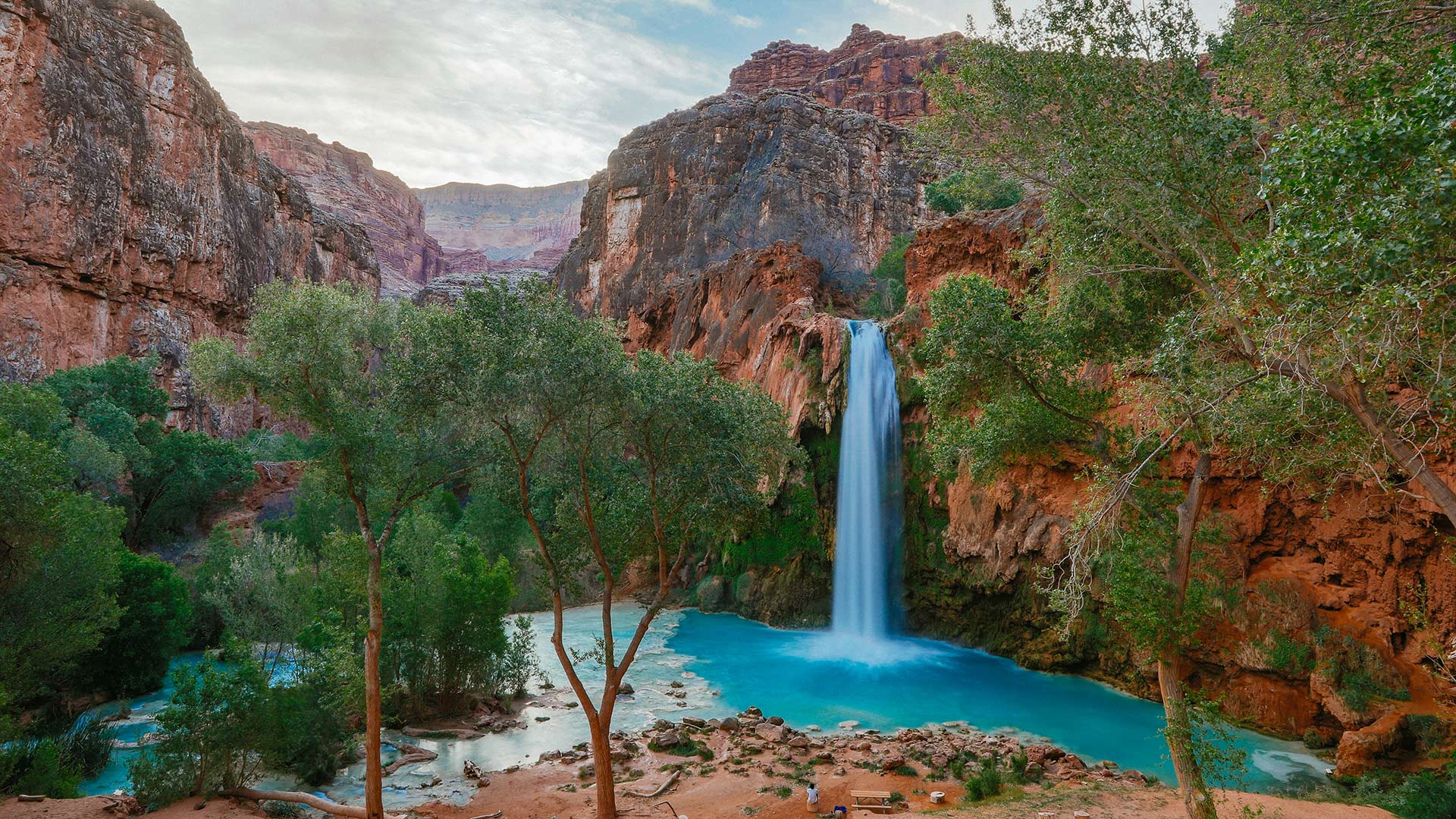 Havasu Falls
Havasu Falls
The blue-green waters of Havasu Falls that attract thousands of tourists each year, turned brown after a flash flood last Thursday that claimed the life of a woman from Gilbert, Arizona.
After a weekend of evacuations and supply deliveries, the Havasupai Tribe is now working with the Federal Emergency Management Agency (FEMA) along with state and county emergency management teams to assess damage and repair costs.
Abbie Fink, spokesperson for the Havasupai Tribe said that the Tribal Council has been meeting frequently over the past few days to discuss the potential timelines for repair and maintenance.
“If they will be able to reopen to tourists anytime soon is dictated then by the schedule of when repairs can begin and ultimately be completed in a safe and efficient way,” Fink said.
The Tribe has announced that Havasu Falls is closed indefinitely.
The area, which relies heavily on ecotourism, is home to a couple hundred tribal members who reside near the falls in the village of Supai.
Of those residents, about 12 families have been displaced.
Carletta Tilousi, Havasupai Tribal Member whose sister and mother live in the village, said that many of those families are staying at the Havasupai Lodge until damage assessments are completed.
“A lot of us tribal members were very worried about our loved ones,” Tilousi said.
Fink noted that a couple hundred tourists were in the area during the flood.
“There were 104 evacuations that occurred that was conducted by the Arizona National Guard, of which just a few were tribal members,” Fink said.
Search and rescue efforts for the missing tourist, led by the National Park Service, concluded on Sunday when her body was recovered from the Colorado River.
Due to unreliable cell service and limited access to technology, the primary warning system before the flood relied on tribal members who work in tourism to notify people of the potential dangers of monsoon season.
“We rely very heavily on the individuals that work there and then what we saw was how supportive the tourists were in helping notify others that were around them and assisting those that needed to get up to higher ground,” Fink said.
Although it is difficult to determine how the Tribe’s ecotourism revenue will be impacted, the reservation system’s terms and conditions are nonrefundable and noncancellable, regardless of weather conditions.
“It will certainly impact in the case of the other ancillary things that visitors will do while they’re there, [like] purchasing meals from the cafe or buying supplies from the store,” Fink said. “But it’s a hard estimate right now to determine what the economic impact will be and how to overcome what that looks like in future tourism seasons.”
The Tribe declared a state of emergency over the weekend, enabling the activation of federal assistance. However, more assessments are needed in order to determine the necessary aid moving forward.
Tilousi, a former council member and active environmental justice advocate for the community, has been working with White House officials and FEMA to declare Supai a disaster area.
She is also coordinating donations for the affected community.
“We’ve been going at it for the last three days and just coordinating all the donations in boxing and taping them, getting them ready for slinging them down on the helicopter,” Tilousi said and added that she will be meeting Governor Katie Hobbs in Supai, this coming Friday.
The tribe has expressed gratitude for the outpouring of support by the community at large so far, but more help is still needed.
Fink mentioned that cleaning supplies, non-perishable food items, dog and cat food and horse feed are needed to be distributed directly to the tribal members.
“At such time, as we can set up an opportunity for cash contributions, we’ll do that as well,” Fink said.
“We are not out of the monsoon season yet, we’re still in it so we’re just bracing to make sure that Mother Nature is not as harsh as she was and give us a little bit of pity so that we can clean up and get back to what life is normal in the canyon,” Tilousi said.
Flash flooding is not uncommon in the region; recent floods occurred in 2018 and again in 2022.
Tilousi said that tribal members were able to evacuate all the tourists safely both times.
“Some of our tribal members risk their lives, put their lives on the line to save tourists and work together to make sure they are all evacuated,” Tilousi said. “It’s a big task when this happens, it takes a toll on the community and our resources.”
Tilousi mentioned that each flooding event appears to be more severe for the community than the last.
Those who are interested and able to donate items in need are able visit the official Havasupai Tribe website.

By submitting your comments, you hereby give AZPM the right to post your comments and potentially use them in any other form of media operated by this institution.